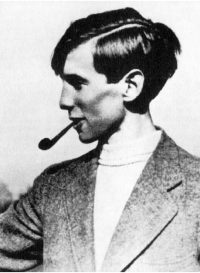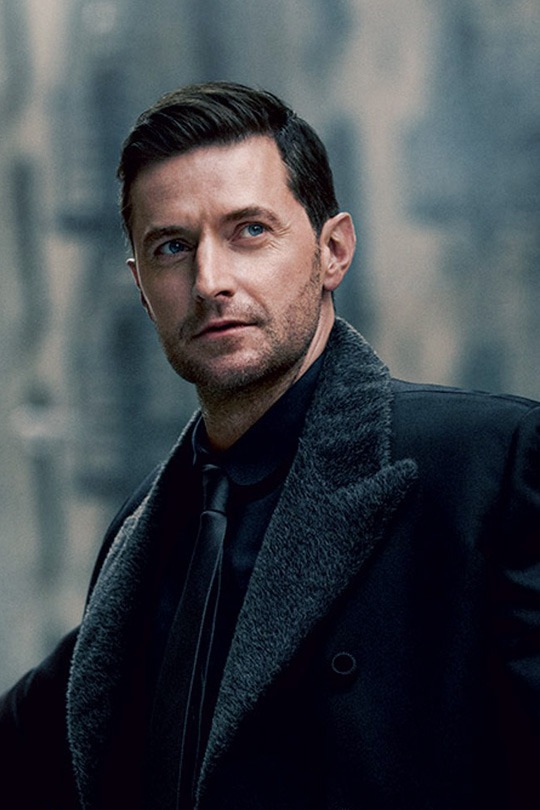A Tolkien Blog Party. What could be better?
My first entry into this delightful blog party hosted by Hamlette, from
The Edge of the Precipice, is dually a write-up celebrating and squealing over Tolkien's genius, and a post to add into mine and Anna's 'Cool Persons' list, which is sadly lacking in cool persons at the current moment. Very advantageous for all parties concerned. Anyway, on to the bio/squeal-fest.
J.R.R. (John Ronald Reuel) Tolkien was born on January 3rd, 1892, in Bloemfontein, South Africa. That's right, Tolkien was African. Betcha didn't know that, huh? I mean, he was a British citizen, but he was born in Africa, so that kinda counts, right?

When Tolkien was three years old, he went to England with his mother and younger brother. His father, Arthur Reuel Tolkien, was to come with them, but he died of rheumatic fever before he had the chance to join them. This left the family without any source of income so Mabel Tolkien took her two children to live at her parents house in Kings Heath, Birmingham. Mabel taught her sons at home (that's right, Tolkien was homeschooled 😎). As you can probably guess, Ronald, as he was known to his family, was a keen and intelligent pupil. Tolkien enjoyed botany and the drawing of landscapes and trees, but what he most enjoyed were his lessons concerning languages. His mother taught him the rudiments of Latin very early on in life. Mabel Tolkien was received into the Catholic church in the year 1900, which lead to the stopping of all financial assistance from her staunchly Baptist family. In 1904, when Tolkien was 12 years old, his mother died of acute diabetes. She herself was only 34 at the time, which is about as long as a person with diabetes mellitus type 1 could be expected to live without treatment. Insulin would not be discovered until two decades later. And as the Tolkien's now had no money, Mrs. Tolkien could not afford treatment. 9 years after her death, Tolkien wrote this:
'My own dear mother was a martyr indeed, and it is not to everybody that God grants so easy a way to his great gifts as he did to Hilary and myself, giving us a mother who killed herself with labour and trouble to ensure us keeping the faith.'
And here I end our short biography, as Tolkien's love of languages leads me to my post about his (and my) love of poetry. I encourage you to read a book or an article about Tolkien's full life story, as it is truly incredible.
Mr. Tolkien was surely a master of words. There is no doubt about that. It's one of the reasons I love his work so much. It's incredibly beautiful, guys! But although Tolkien's everyday, humdrum, prose is beautiful in itself, what is even MORE amazing is his poetry! Allow me to share with you some of my favorite lines and poetry of his and listen patiently while I explain WHY they're my favorites.
Two stanzas from 'The Dragon is Withered':
The stars are far brighter
Than gems without measure,
The moon is far whiter
Than silver in treasure:
The fire is more shining
On hearth in the gloaming
Than gold won by mining,
So why go a-roaming?
Isn't that just beautiful? In those two little stanzas one is come over with a feeling of adventure, touched with nostalgia. I can see the stars, smell the pine needles, feel the cold wind of night. And then we are brought back to earth by the last three lines, making us think of a warm, crackling fire, and a comfortable armchair. Tolkien tells us that the gems and treasures of nature that we are given by God and the comforts of a good home are worth far more than any material treasure or wealth we could gain by roaming and adventuring. Or the modern parallel of adventuring, the desire to become the richest and most powerful CEO of some big company and be known for you endless ambition. I love this whole poem so much, but these just might be my two favorite stanzas.

Most everyone know the famous 'All that is gold does not glitter' poem, but sometimes we forget to think of it in the context of it's place in the book, and even of whom it is written. So let's do a quick re-cap. When the hobbits arrived at the inn of the Prancing Pony to meet Gandalf, they discovered to their dismay that he was not there. But unlike in the movie, where Gandalf just doesn't show up and they are thrown into the clutches of Strider knowing nothing about him, in the book Gandalf has left the hobbits a letter (which, consequentially, old Butterbur, the innkeeper, forgets to give to them at first). Very considerate of him. And in that letter, Gandalf informs the hobbits that they are to be taken to Rivendell by a man named Aragorn, who is also known as Strider. This poem describes him:
All that is gold does not glitter,
Not all those who wander are lost;
The old that is strong does not whither,
Deep roots are not reached by the frost.
From the ashes a fire shall be woken,
A light from the shadows shall spring;
Renewed shall be blade that was broken,
The crownless again shall be king.
An incredibly beautiful and mysterious poem. Arwen quotes the last four lines in the movie 'The Return of the King' when Anduril is being made whole again. The entire poem embodies the essence of Aragorn, son of Arathorn. Dirty and bent up on the surface, but pure gold underneath. He has no desire to be a king of men, but he will rise to the challenge when called. Why? Because that's what heroes do! Sorry, just had to say that.
'These are not holes,' said Gimli. 'This is the great realm and city of the Dwarrowdelf. And of old it was not darksome, but full of light and splendour, as is still remembered in our songs.'
And so the Song of Durin commences. Gimli chants it to his companions while journeying through the Mines of Moria. It is a glorious remembrance of greater days, and a sad lament of the times that are now gone. What strikes me most about this poem is the parallel between the first stanzas and the last two. Rather bookendish.
The world was young, the mountains green,
No stain yet on the Moon was seen,
No words were laid on stream or stone
When Durin woke and walked alone.
He named the nameless hills and dells;
He drank from yet untasted wells;
He stooped and looked in Mirrormere,
And saw a crown of stars appear,
As gems upon a silver thread,
Above the shadow of his head.....
(............)
The world is grey, the mountains old,
The forge's fire is ashen-cold;
No harp is wrung, no hammer falls:
The darkness dwells in Durin's halls;
The shadow lies upon his tomb
In Moria, in Khazad-dum.
But still the sunken stars appear
In dark and windless Mirrormere;
There lies his crown in water deep,
Till Durin wakes again from sleep.
From the beginning of the poem and throughout the middle, Tolkien tells us of the splendor and wealth of the dwarves. He tells us of their gold and gems, their works of great art and beauty, the very peak of Dwarven civilization. We walk with Durin, until the end. You can completely feel the fall of all that is great and splenderous in the last two stanzas. It's like night fell and Durin is now standing alone looking over a dark pool with a cold wind whipping his hair and fur-trimmed cloak (despite the fact that Mirrormere is windless). The rise and fall of Dwarvin majesty put into one poem. And certainly a very lovely poem. Clamavi de Profundis, a channel on Youtube, does a very worthily Dwarvish version of the Song of Durin. You can check it out
here.

Yet another favorite of mine, the poem that Bilbo recites, with long awaiting anticipation fulfilled, after he lays his eyes on his own little hobbit hole in the distance. This one is rather like 'The Dragon Is Withered' in its mood, I think.
Roads go ever ever on,
Over rock and under tree,
By caves where never sun has shone,
By streams that never find the sea;
Over snow by winter sown,
And through the merry flowers of June,
Over grass and over stone,
And under mountains in the moon.
Roads go ever ever on
Under cloud and under star,
Yet feet that wandering have gone
Turn at last to home afar.
Eyes that fire and sword have seen
And horror in the halls of stone
Look at last on meadows green
And trees and hills they long have known.
Just like 'The Dragon Is Withered', 'Roads Go Ever On' speaks of adventure and wandering, but inevitably finds itself back home, in familiar woods and meadows. Makes me sigh with longing and content. And I have to leave you with another link to Clamavi de Profundis, 'cause I like
their version of this poem even better than the Song of Durin.
So, I'm just flipping through The Lord of the Rings and The Hobbit right now, and I am realizing that if I write about all the poems I would LIKE to write about, you'd be snoozing with boredom before you'd even finished half of this post. So I'll just tell you that I LOVE both the Lament for Boromir (a worthy lament for an awesome warrior who came into honor when the time came) and the Lament for the Rohirrim. In fact, just give me a lament and I'll probably adore it. But there are so, SO, many more works of Tolkien's I would love to share with you, but that is for another time. Most likely a period of several years. Or even decades. Yeah, I could definitely talk about that guy and his creations for several decades. So instead of doing that (after all, I have other things to do in life than talk about Tolkien. Lame, I know.) I'll just leave you with one more lovely poem. This poem Legolas sings when the war for the One Ring is all over and done with, and many comrades are bidding each other farewell. Legolas tells his friends that he shall walk in the woods of this fair land, but maybe soon, maybe in a hundred years of Men, he shall go down to the shore and cross the great water to the land across the sea. And Gimli will probably come with him. Hopefully.
To the Sea, to the Sea! The white gulls are crying,
The wind is blowing, and the white foam is flying.
West, west away, the round sun is falling.
Grey ship, grey ship, do you hear them calling,
The voices of my people that have gone before me?
I will leave, I will leave the woods that bore me;
For our days are ending and our years failing.
I will pass the wide waters lonely sailing.
Long are the waves on the Last Shore falling,
Sweet are the voices in the Lost Isle calling,
In Eressea, in Elvenhome that no man can discover,
Where the leaves fall not: land of my people for ever!
~ Irene

~






















